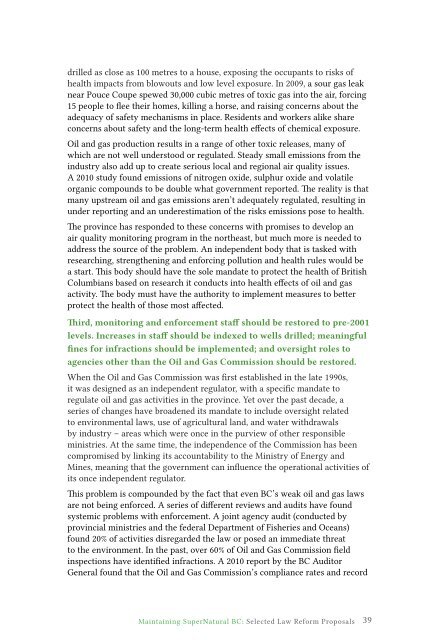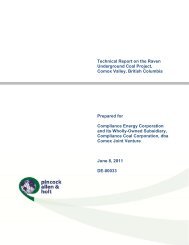Maintaining SuperNatural BC for Our Children - CoalWatch Comox ...
Maintaining SuperNatural BC for Our Children - CoalWatch Comox ...
Maintaining SuperNatural BC for Our Children - CoalWatch Comox ...
- No tags were found...
Create successful ePaper yourself
Turn your PDF publications into a flip-book with our unique Google optimized e-Paper software.
drilled as close as 100 metres to a house, exposing the occupants to risks ofhealth impacts from blowouts and low level exposure. In 2009, a sour gas leaknear Pouce Coupe spewed 30,000 cubic metres of toxic gas into the air, <strong>for</strong>cing15 people to flee their homes, killing a horse, and raising concerns about theadequacy of safety mechanisms in place. Residents and workers alike shareconcerns about safety and the long-term health effects of chemical exposure.Oil and gas production results in a range of other toxic releases, many ofwhich are not well understood or regulated. Steady small emissions from theindustry also add up to create serious local and regional air quality issues.A 2010 study found emissions of nitrogen oxide, sulphur oxide and volatileorganic compounds to be double what government reported. The reality is thatmany upstream oil and gas emissions aren’t adequately regulated, resulting inunder reporting and an underestimation of the risks emissions pose to health.The province has responded to these concerns with promises to develop anair quality monitoring program in the northeast, but much more is needed toaddress the source of the problem. An independent body that is tasked withresearching, strengthening and en<strong>for</strong>cing pollution and health rules would bea start. This body should have the sole mandate to protect the health of BritishColumbians based on research it conducts into health effects of oil and gasactivity. The body must have the authority to implement measures to betterprotect the health of those most affected.Third, monitoring and en<strong>for</strong>cement staff should be restored to pre-2001levels. Increases in staff should be indexed to wells drilled; meaningfulfines <strong>for</strong> infractions should be implemented; and oversight roles toagencies other than the Oil and Gas Commission should be restored.When the Oil and Gas Commission was first established in the late 1990s,it was designed as an independent regulator, with a specific mandate toregulate oil and gas activities in the province. Yet over the past decade, aseries of changes have broadened its mandate to include oversight relatedto environmental laws, use of agricultural land, and water withdrawalsby industry – areas which were once in the purview of other responsibleministries. At the same time, the independence of the Commission has beencompromised by linking its accountability to the Ministry of Energy andMines, meaning that the government can influence the operational activities ofits once independent regulator.This problem is compounded by the fact that even <strong>BC</strong>’s weak oil and gas lawsare not being en<strong>for</strong>ced. A series of different reviews and audits have foundsystemic problems with en<strong>for</strong>cement. A joint agency audit (conducted byprovincial ministries and the federal Department of Fisheries and Oceans)found 20% of activities disregarded the law or posed an immediate threatto the environment. In the past, over 60% of Oil and Gas Commission fieldinspections have identified infractions. A 2010 report by the <strong>BC</strong> AuditorGeneral found that the Oil and Gas Commission’s compliance rates and record<strong>Maintaining</strong> <strong>SuperNatural</strong> <strong>BC</strong>: Selected Law Re<strong>for</strong>m Proposals 39



